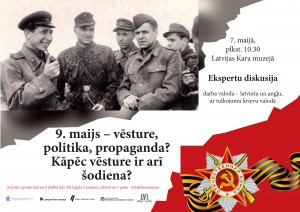 On May 7, at 11.00, experts’ discussion “May 9 – History, Politics, Propaganda? Why Is History Also the Present Time?” will be held in Latvian War Museum.
On May 7, at 11.00, experts’ discussion “May 9 – History, Politics, Propaganda? Why Is History Also the Present Time?” will be held in Latvian War Museum.
The event is planned as an international and interdisciplinary discussion of experts with the aim to explain why the significance of May 9 in Russia and the Baltic states differs; why this date is politicized; how this politicizing is shaped with the help of outright propaganda and the other tools of information influence, as well as how it is “delivered” to various audiences. The experts will evaluate also how it is causing split in the Baltic countries’ society, and how this date has become the important factor in security context.
The undertaking will be introduced by three thematic lectures, presented by experts. Valdis Kuzmins, Historian at Latvian War Museum, will offer illustration of how the celebration of May 9 has developed and is promoted in Russia. Uldis Neiburgs, Head of Public History Section of the Museum of the Occupation of Latvia, will briefly elucidate the issue of what was the meaning of the World War II for the state of Latvia and its citizens, and which War-related historical issues are urgent for Latvia’s society nowadays. Andis Kudors, Executive Director of the Centre for East European Policy Studies, will explain how Russia uses history in the process of implementation of its foreign policy.
During the discussion sections of the event, politicizing of May 9 is planned to be analyzed, and the issue of the use of this date for malicious propaganda purpose will be addressed.
70 years ago, on May 9, in a repeated ceremony, the USSR officially accepted the capitulation of fascist Germany thereby marking the conclusion of the World War II in Europe. Since that time, May 9 has been celebrated in Russia as the anniversary of the victory in the World War II, ignoring the fact that, for a number of states, the end of the War meant the beginning of a new occupation and continuation of the related human tragedies. The lack of wish to see the manifold nature of May 9 and the contradictory context of the celebration of victory still has its impact on the Baltic countries’ society and political environment. The division in “victors” and “Nazi/fascists” not only causes split in society, but it even serves as the pretext for military aggression. As it is known, Russia’s military invasion in Georgia and Ukraine was explained by fight against “Nazi”. Should May 9 be really regarded as the victory day, or rather the commemoration day? How is this “victory” politicized? How are the communist totalitarian regime crimes assessed from judicial aspect? These and the other issues will be addressed during the first stage of discussion by historians Ritvars Jansons and Arturas Svarauskas, Riga Graduate School of Law professor Ineta Ziemele and the Centre for East European Policy Studies researcher Māris Cepurītis chaired by the moderator Aleksejs Grigorjevs.
Although May 9 is the historical event, we still feel its presence also nowadays. Is it the result of self-mobilizing of society, or a manipulative instrument in the hands of states and political groups? What are the ways of use of this event, and what are the objectives of the particular activities? How does the historical-political propaganda look like today? During the second stage of the discussion, these issues, while deliberating upon the use of May 9 for propaganda purposes, will be addressed by Ukrainian political scientist Olesya Yakhno, the well-known communication expert from Estonia Raul Rebane, as well as journalist and publicist Sandra Veinberga.
The event will include screening the film “God, Thy Earth Is Aflame! World War II and the Occupation of Latvia, 1939-1945” created by historians Uldis Neiburgs, Kaspars Zellis and director Askolds Saulītis. It is one of the reel series, produced within Latvia Republic Ministry of Culture and the Museum of the Occupation of Latvia society integration project “Basis of the State of Latvia, History and Nowadays”.
Exhibition “The Day Men Cried. The End of the Second World War in the Photos of the Latvian War Museum” will be opened prior to the undertaking.
The event is organized by Latvian War Museum, the Museum of the Occupation of Latvia, the Centre for East European Policy Studies, the Institute of Philosophy and Sociology, University of Latvia, the Institute of Latvian History, University of Latvia.
The event languages are Latvian and English, with interpretation in the Russian language. The interested persons are invited to register their participation, using e-mail address info@karamuzejs.lv.
It will be possible to follow the event online on the organizers’ Internet pages: www.delfi.lv, www.karamuzejs.lv, www.appc.lv, www.okupzcijasmuzejs.lv.
Program available here.
